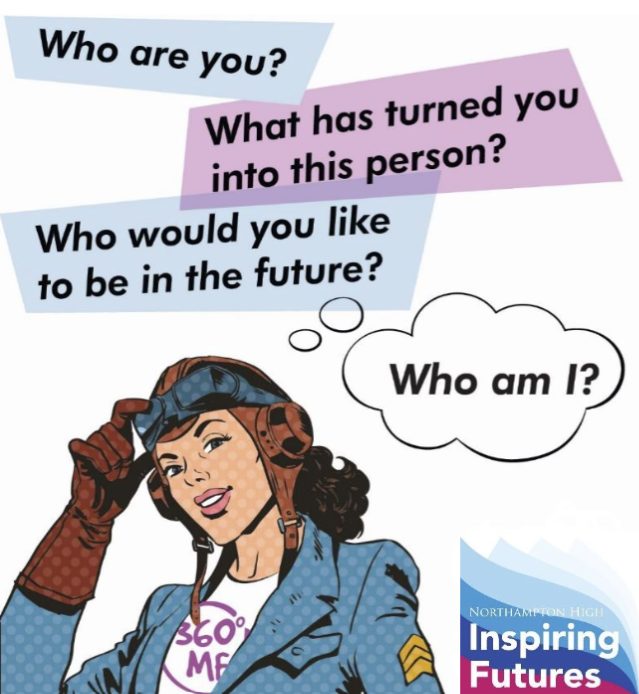In the rapidly evolving landscape of the 21st Century, careers education is no longer solely about finding the right job; it has become a dynamic process aimed at equipping students with a versatile skill set that transcends the boundaries of specific professions. To do it well requires a holistic approach that not only provides relevant information and guidance, but also fosters essential skills to ensure adaptability in the face of a job market increasingly impacted by artificial intelligence (AI). This is why careers education appears under the Learn section in the Northampton High School approach wheel, as a keystone of our academic provision, cutting across all areas of learning.
 It is a pleasure to introduce our new Careers Coordinator, Wendy Forsyth, who will be known to many of you as a member of the Maths faculty. Mrs Forsyth comes from an engineering background and runs the popular ‘problem-solving maths’ elective in the Sixth Form. This course focuses on the kinds of skills needed in mathematics to develop solutions to some of the most important issues facing the world today. She is also a tutor in the Sixth Form and has worked closely with students and other staff members to help them choose the best courses at university to enable them to achieve their ambitions for the future.
It is a pleasure to introduce our new Careers Coordinator, Wendy Forsyth, who will be known to many of you as a member of the Maths faculty. Mrs Forsyth comes from an engineering background and runs the popular ‘problem-solving maths’ elective in the Sixth Form. This course focuses on the kinds of skills needed in mathematics to develop solutions to some of the most important issues facing the world today. She is also a tutor in the Sixth Form and has worked closely with students and other staff members to help them choose the best courses at university to enable them to achieve their ambitions for the future.
Mrs Forsyth writes:
Having been a Sixth Form tutor for many years, I have always enjoyed helping students explore their next steps. I am therefore very excited to be taking on the role of Careers Coordinator across the school.
Careers education is about so much more than simply deciding what job you want to do. As a school we understand the need to prepare our students to succeed and to be ready to lead in an ever-changing world. A recent survey by the British Council said that two thirds of Primary School children will enter careers which do not currently exist. The rapid developments in the realm of AI will further change the nature of employment.
Academic knowledge is still very important, but equally it is essential that young people are aware of their transferable skills and seek opportunities to develop them. With this in mind, we prefer to think more broadly and we call our suite of activities and guidance opportunities ‘Inspiring Futures’. The Inspiring Futures programme is wide ranging, incorporating PSHE lessons, external speakers, enterprise days and specific advice and guidance events. If you’d like to know more about this, do feel free to contact me by emailing w.forsyth@nhs.gdst.net.
So, we firmly believe that careers education should encompass a broader perspective, emphasising the importance of acquiring transferable skills that can be applied across various domains. But what does this mean in practice? Rather than focusing solely on the technical aspects of a particular job, we feel that students need to develop critical thinking, creativity, communication, and problem-solving skills. These abilities form the foundation of adaptability, enabling individuals to navigate through unpredictable career trajectories and embrace emerging opportunities. 
Incorporating real-world experiences into the curriculum is another crucial aspect of effective careers education. Every subject area in school offers resources and invaluable insights into different industries, helping pupils make informed decisions about their career paths. Through the GDST Innovate and Lead programmes in the Sixth Form, students can also access diverse work environments, which not only aids in identifying personal preferences but also cultivates an understanding of the future job market.
Furthermore, the role of technology in careers education cannot be overstated. With increasing automation and AI formats in the workplace, the skills demanded by the job market are undergoing a paradigm shift. Integrating technology-related coursework and fostering digital literacy via our Digacy programme in school are essential components in preparing students for the jobs of tomorrow. This not only ensures that pupils are equipped to embrace technological advancements but also promotes a mindset of continuous learning, a critical attribute in an era where the pace of change is unprecedented.
To ensure that pupils have the best information and guidance, as schools, we must collaborate closely with industry experts, keeping our resources updated to reflect the latest trends and demands. Career support should extend beyond merely suggesting professions based on current market trends; we also need to focus on cultivating students’ self-awareness, helping them understand their strengths, values, and interests, laying the groundwork for a fulfilling and adaptable career. We do this through our ePortfolio programme based on our ‘360-degree Me’ concept that encourages students to reflect on what has made them who they are today and to consider who they would like to be in the future.
As Mrs Forsyth has mentioned, predicting specific jobs can be challenging due to the rapid pace of technological innovation. However, we can anticipate a growing demand for roles that bridge the gap between human capabilities and advanced technologies. Jobs in fields such as artificial intelligence ethics, digital health management, sustainable energy consultancy and virtual reality experience design are likely to emerge as prominent career options.
In conclusion, careers education is undergoing a transformative shift from a narrow focus on job placement to a more holistic approach that prioritises adaptable skill development. By providing students with a diverse skill set, real-world experiences, and a technology-infused curriculum, we believe we can empower them to thrive in an ever-changing job market. The key lies not only in preparing students for specific professions but in nurturing a mindset that embraces change, fosters continuous learning, and positions individuals to navigate the uncertainties of the future with confidence.
Mr Rickman
Deputy Head Pastoral